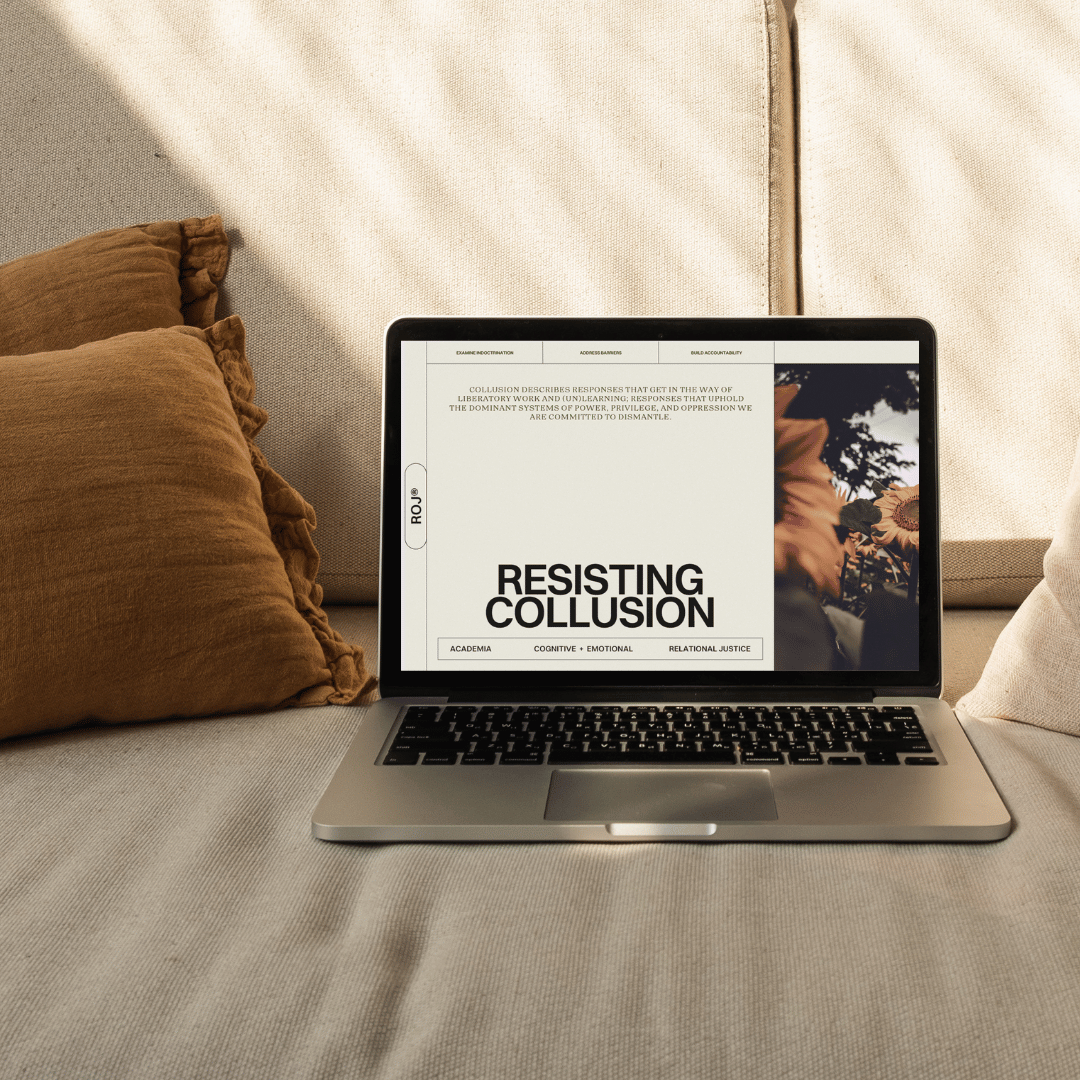
Learn to navigate the most common barriers to justice-oriented practice.
the Resisting Collusion Workshop Series
We got you
You want to incorporate justice-oriented, anti-oppressive practices in your life + work, but feelings of overwhelm and helplessness make it difficult for you to fully engage in unpacking the gravity of our systems…and our complicities in it.

What is Collusion?
Collusion describes responses that get in the way of liberatory work and (un)learning; responses that uphold the dominant systems of power and oppression we are committed to dismantle.
We’ve all felt the helplessness, the overwhelm, the urgency to do better. These responses are common and can come up at all stages of the work - we’ve all been there in one way or another!
Unfortunately, conversations about how we navigate these responses are not so common. Let’s change that, shall we? Let’s hold each other in radically loving accountability.
We created this workshop to share our decades+ of experience in justice-oriented, anti-oppressive practices so you can have a framework to start building your map to resisting collusion… while also having a held space to do this deep, liberatory work in community.




















Click through to read about the 4 modules
-
Academia’s Contribution to Collusion
Many of us are grateful for our education. At the same time, academia is inherently problematic. In this module, we explore nuances like academia’s prioritization of “getting language right”; its role in decontextualization; its positioning of clients as sources of fear, harm, and shame; reframe ownership of knowledge to relational creation; and how we shift into using lenses over modalities.
-
Navigating Cognitive Collusion
We discuss moving through common responses to collusion that act as barriers to the work by recognizing nuances in responsibility, shifting the map of what it means to be client-centered, and creating space for autonomy and choice. We also address how conversations about power are useful for folx who live in privileged bodies.
-
Navigating Emotional Collusion
After sharing common narratives that contribute to emotional responses of collusion, we explore how we can shift from overwhelm + helpless, to grief + rage; move away from punitive culture through recognizing accountability and capacity; and exploring shame, hope, and dreaming as resistances to hopelessness.
-
Inviting Relational Justice
As we wrap up our deep dive, we ground our learning into Relational Justice, exploring its relationship with collective liberation and transformative justice, as well as the multiple dimensions of accountability.
This is vulnerable work…
Who’s holding this space for you?
Welcome, I’m Bhupie,
Currently, I work as a therapist, supervisor, professor, and consultant, informed by social justice and collaborative principles. I am honoured to work alongside people who are navigating and resisting multiple systems of oppression individually, within relationships, and in communities. Supervision is an enriching experience for me—a space where I can engage in collaborative dialogue about best practices and ethics alongside critique and feedback. I also provide workshops, trainings, and consultations to organisations, teams, and boards. I’m an adjunct faculty at various local graduate programs and a board member at Healing in Colour.
Hey! I’m Abby,
I found my way to this work through exploring and navigating my own relational harms through the lens of privilege and systemic oppression. Aside from my counselling practice and various front line roles, my work primarily involves providing clinical supervision and business consulting to justice-oriented practitioners and agencies, as well as teaching at various local graduate programs and being a board member for Healing in Colour.
How the workshop runs
(+ other FAQs)
FAQs
-
Tuition for this live community learning event and pre-recorded material is $450 per seat.
-
The next live is going to be on Monday, May 16th at 9-11 AM PST. If you need a different live time in order to participate, please email hello@reflectingonjustice.com
-
In order to facilitate safer spaces for this work, the live will not be recorded. We will, however, document the insights we co-create and send these notes to all participants along with some further reflection prompts and thoughts to be shared. That way you’ll be able to follow along with us if you’re not able to attend, and if you are able to attend, you don’t have to worry about taking notes.
-
We get how vulnerable this process might be! All participation is voluntary and we ask that you let us know if there are any access needs that might be helpful for your participation. In the spirit of building community with one another and respecting the contribution of other group members, we would prefer that you are able to keep your camera on while you’re with us.
-
The live will be hosted over Zoom. You’ll get a link sent to your email 24 hours prior to the start of your session.
-
Access to this program for 6 months. During this time you’ll be able to watch and rewatch any of the video content. Any downloadable content is for you to keep (but make sure you download it within the 6 months!).

You might be thinking:
What if I can’t live anti-oppression when it matters most? There’s just so much to unlearn.
The truth is, no one does anti-oppression perfectly and this training is only ONE way to start. It would be disingenuous and hypocritical of me to say this is the only right way to go about it. What I do know is that anti-oppression is a commitment to process. It doesn’t center perfection, it centers impact.
What kind of impact comes from you doing the self-reflection and unlearning needed to disrupt power in your life and practice, even if you sometimes make mistakes? How can you cultivate the humility, accountability, and rebelliousness required to continue when the tyranny of perfectionism wants to center itself in your ethics?
I asked myself these same questions when I felt so much shame, believing I wasn’t “doing justice right”. Through trial and error, I’ve learned a lot about what it takes to stay in the work.
We’ve put all our research, strategies, and failure-led knowledge into this training and reflection framework so you can build on this practice, too. You’re not supposed to be perfect. In fact, if you’re perfect…maybe this isn’t where you need to be.
AND - You’re not alone:
thoughts from our community thoughts from our community thoughts from our community thoughts from our community thoughts from our community thoughts from our community
Thoughts from our community






